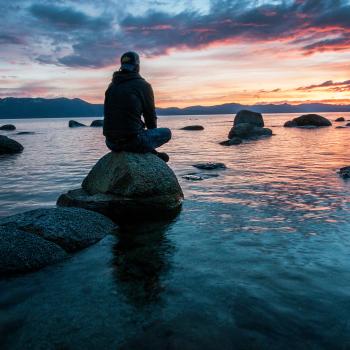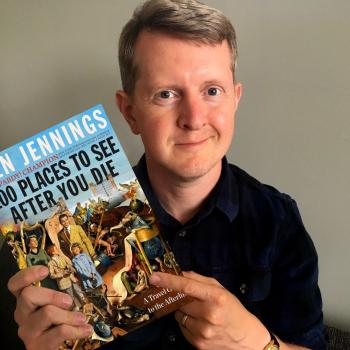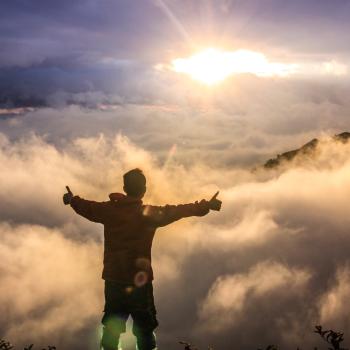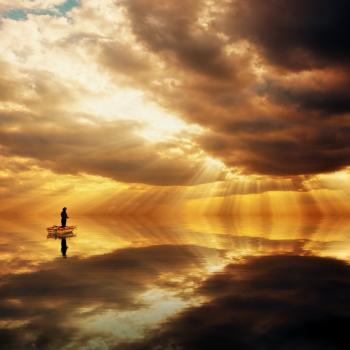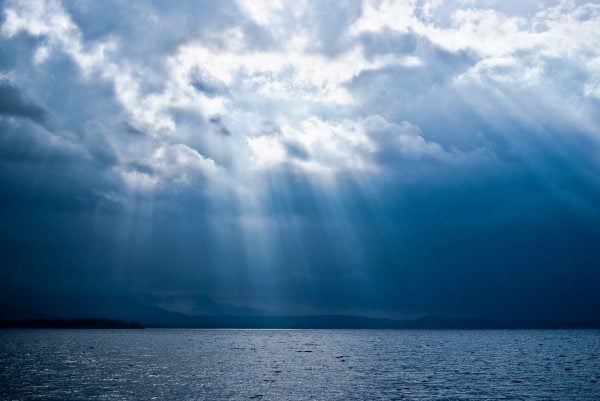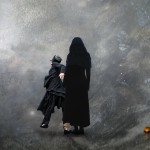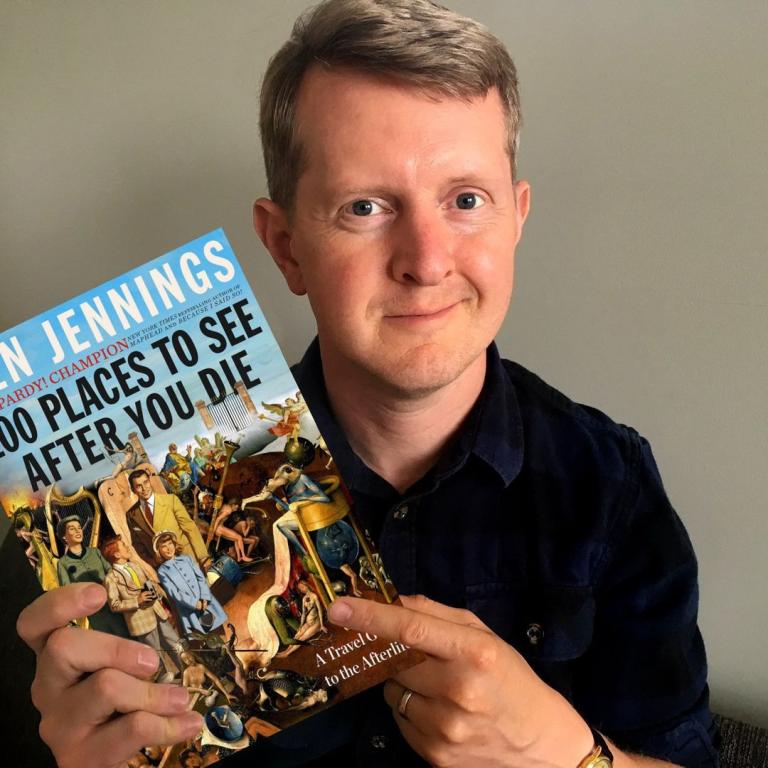
You might know Ken Jennings as the host of the popular game show Jeopardy and a former long-running champion on the show. But he’s also an author who has published several books. His latest release caught my eye as soon as I saw the title: 100 Places to See After You Die.
Jennings explores the different visions of heaven and hell found in mythology, books, movies and television. But what I think Wake Up Call readers might find most interesting are the descriptions of heaven and hell found in various religions. Forget about thoughts of entering through pearly gates and being greeted by deceased friends and family members. In many religions, the path to heaven (or its equivalent) can be downright treacherous.
Here are a few examples that Jennings has called out in 100 Places to See After You Die. As hinted at by the book’s title, Jennings adds an element of humor to his stories, though I’m going to cut straight to the chase. Here are 3 versions of the afterlife that may leave you feeling a little uneasy.
- Buddhism. Yes, you’ll be reincarnated. Eventually. But if you didn’t “devote yourself to the practice of dharma in life,” early Buddhist writings tell of eight fiery hells where you may have to spend some time before being reborn. Jennings reports that “The floor of these prisons is hot iron, and the flames rising from them spread for miles in all directions.” Later writings add ten “cold” hells to the mix, which are located on dark and frigid mountains.
- Jehovah’s Witnesses. An early text from the Witnesses explained that only 144,000 “anointed” Christians would make it to heaven. The only issue: there are now almost nine million Jehovah’s Witnesses worldwide. As Jennings points out, “heaven has a more daunting admissions rate than Harvard.” However, in 1935, a church leader broadened the idea of heaven to also include an alternate version: a “paradise earth” free of death, disease and unhappiness. It’s a consolation prize for those not making the 144K cut.
- Judaism and Christianity. The concept of “Gehanna” is introduced in the Old Testament and is also mentioned by Jesus in the New Testament. It’s often defined as “hell.” (Though it’s important to note that nowhere in the Bible does it explicitly state that our souls go to heaven or hell when we die.) On this journey, death begins with a visit to Gehanna where you’ll meet the Angel of Death. This a hell where you’ll be “tormented by rivers of hot pitch, open pits full of lions, hideous worms, terrible itching, and angels of destruction.” But after a year of “purification,” you’ll be permitted to enter the beautiful garden of the righteous, Gan Eden.
Heaven seems like a tough place to get into, doesn’t it?
Fortunately, Jennings mentions several religion-based descriptions that paint a prettier picture of heaven and what we might encounter. Here are two that stood out to me as being especially appealing:
Swedenborgianism. This idea was first introduced by the Christian theologian, philosopher, and mystic Emmanuel Swedenborg and was based on his visions of the afterlife. Swedenborg, who lived in the 1700s, is said to have influenced a large range of people including Ralph Waldo Emerson, Helen Keller, poet Robert Frost, and President Franklin Delano Roosevelt. Swedenborg wrote an influential book titled Heaven and Hell, and Jennings explains:
In Swedenborg’s visions, he saw that the “spiritual world” consists of heaven, hell, and a third realm: The World of Spirits, which will be the first step on your (afterlife) journey. When your heart stops at the end of this life, angels from the Lord’s spiritual kingdom will arrive to usher you onward.
Jennings tells us that in rare cases, some of the dead will move immediately into heaven—or plunge right into hell. “But most people will spend some time in the World of Spirits sorting out their final destiny.” Some will spend weeks, while others will spend several years. Jennings continues:
This is a world of introspection and instruction, as you gradually get a clearer view of eternity. At first, you’ll find yourself in surroundings so much like this world, you’ll forget you are dead. After all, you’re the same as ever, still able to think, talk, sense, touch.
But gradually, you’ll move into a state of deeper awareness and begin to judge your past life. What kind of person were you? Were you as kind and truthful as you should have been? Ultimately, the judgement on whether you belong in heaven or hell does not comes from God. You decide. Visions of your past life will pull you one way or the other, and if you’re fortunate enough that the scales tilt toward heaven, you’re in for an enjoyable stay.
While hell is filled with suffering and pain, heaven is a place of love, joy, and happiness. Inhabitants of heaven find they are always learning and growing, and their lives are filled with purpose and meaning. The Swedenborg Foundation reports that the deceased “sleep and wake, love, breathe, eat, talk, read, work, play, and worship. They live a genuine life in a real spiritual body and world … in many ways quite similar to the natural world.” And you’ll be living amongst people you like and seem to know:
People of similar quality all recognize each other there just the way people in this world recognize their neighbors and relatives and friends, even though they may never have seen each other before. This happens because the only relationships and kinships and friendships in the other life are spiritual ones and are therefore matters of love and faith.
Wicca. This pagan (or non-Christian) religion incorporates beliefs outside of mainstream religions. This includes a deep respect for the Earth, the worship of nature and in some cases, magical rituals. While beliefs differ greatly among Wiccan groups, many believe in a heaven-like place called “The Summerland.” Jennings describes it as “a place of rest and reflection” where spirits can “recover from life’s troubles and make plans for their next reincarnation.” An AI-generated story presents The Summerland like this:
It is a beautiful, paradisiacal realm, often depicted as a lush, green land with flowers, trees, and streams. The climate is warm and sunny, and the air is filled with the sound of birdsong. The inhabitants of the Summerland are said to be free from pain, suffering, and sorrow. They can spend their time learning, growing, and connecting with other souls.
It’s also a place for a reunion with deceased loved ones. Eventually, the inhabitants of The Summerland return to earth, reincarnated. They have little to no memory of their time there—but the lessons they learned there are engrained within their souls. Some believe that after many incarnations, you reach a higher level of consciousness and are allowed to stay in the Summerland—for an eternity of happiness and bliss.





